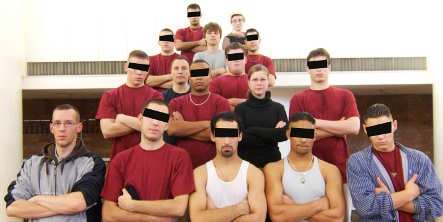Once you’ve gone through the security airlock at the entrance, given your mobile phone to a suspicious-looking man in uniform, and exchanged your ID card for a visitor’s pass, the venue is like any assembly hall in a school. The seating is made of chairs linked together on a raked podium, there’s a bare stage, and the visitor’s hall that serves as a foyer contains vending machines and a cabinet displaying the results of handicraft workshops.
But this is Berlin’s Jugendstrafanstalt, or juvenile detention centre. The place had a shot of negative media attention last year when a documentary by public broadcaster ARD claimed chronic under-staffing meant that the prison staff tolerated drug smuggling at the institution. This controversy stoked all the recurring tabloid fears about youth crime and the attendant beliefs about society’s moral decline. But a new production by aufBruch theatre company is an antidote to these prejudices, attempting with its unique Brecht-inspired aesthetic to break the walls between society and its outcasts.
A young offender’s centre offers more opportunities for self-improvement than a regular prison making it more difficult for the company to stage a play. “It’s a lot harder than directing adult prisoners,” says aufBruch’s long-time director Peter Atanassow, explaining they’ve being producing shows at Berlin’s Tegel prison for 11 years.
“We’ve established an ensemble of long-term prisoners who know what to expect from us there, and that we demand a professional level of commitment. Here there’s a lot of competition and sometimes they just don’t do what you say.”
But what he has to offer the young prisoners is unique: the aufBruch theatre company has established a strong and respected reputation for taking on stories that mirror a prisoner’s own situation. And this is certainly appreciated by inmates.
“I really enjoy it, and I’m definitely going to try and do more theatre when I leave here,” says one of the performers, known by his nickname Blizz.
The current production is called Kaspar H. and it maintains the peculiar tension of all aufBruch’s productions – it is as much about the inmates themselves as about the ostensible subject matter. The audience is not asked to ponder the sensational rumours of a mysterious foundling’s lineage or the unimaginable conditions of his confinement. This is not the conventional re-telling of Kaspar Hauser’s story.
Hauser’s tale has been told often enough to become a recurrent myth in German literature, perhaps culminating in Werner Herzog’s 1974 movie “The Enigma of Kaspar Hauser.”
In 1828, a 16-year-old boy was left on a street in Nuremberg in front of a cavalry officer’s house. He spoke only one sentence: “I want to become a rider like my father once was” and could only write his name. Once he had been taught to speak, he claimed he had been kept in a two-metre wide cell all his life and that he had not seen another human being until shortly before his release, his food being left by his bed while he slept. He quickly became a celebrity, attracted rumours and excited speculation of noble birth, and almost won the patronage of an English lord, before he died aged 21 of what may have been a self-inflicted knife wound.
AufBruch’s focus is on Hauser’s position as a social outcast, and the methods society develops to try to bring outcasts like him back in. “Whether we live in a totalitarian society or a democratic society, there will always be people who fall through the net,” Atanassow says.
Kaspar H. the show is a non-linear collage about re-integration and education, and the effects this has on young men. The young men, all dressed in white, with black boots and braces, speak in chorus or watch as one of them addresses the audience. Dialogue is kept to a minimum, and conventional scenes where someone is “playing” someone else, are non-existent. The audience is never allowed to let go of the metaphorical significance of the situation of the performers, and Atassanaw explains that they were encouraged during rehearsal to adapt and invent texts and new elements.
Thus, the show includes raps, songs (backed by an excellent band of students of the Fanny Hensel music school in Mitte), dance, martial arts and plenty of choral speaking, all in a Babel-like collection of languages.
The spoken chorus is aufBruch’s recurring theme and defining technique and a large part of rehearsal is spent on perfecting it – long texts become powerful, mesmerising chants. The effect it has here is to widen the meaning of Kaspar Hauser’s story. In this show, he is not one strange, isolated boy, but a group of young men dressed uniformly and locked into a disciplined routine. Here, Hauser’s fate is not an exception. He is not a scandal or a sensation, he is like any number of exiles trying to find a way in.
But just like the real Hauser, these boys are not immune to dreams and a sense of their own specialness. At one point in the show, they echo Hauser’s introductory statement of ambition, “I want to become a rider, like my father once was,” and enhance it with their own dreams: “I want to become a racing driver like Michael Schuhmacher once was.” And: “I want to become an actor like James Dean once was,” until finally one voice chimes in: “Whatever happens, I don’t want to become what I have been so far.”
AufBruch is always careful to avoid the conception that their work is meant to reform, and Atanassow was keen to point out that this was a line the boy had invented himself, but it added a starkly affecting moment to a strictly formalist piece of theatre.
KASPAR H.
Kultursaal der Jugendstrafanstalt Berlin
Friedrich-Olbricht-Damm 40
Dates:
Wed, 03.12.2008
Fri, 05.12.2008
Wed, 10.12.2008
Fri, 12.12.2008
Time: 5:30 pm, last entrance 5:15pm
Tickets only available in advance from the Kasse of the Volksbühne.




 Please whitelist us to continue reading.
Please whitelist us to continue reading.